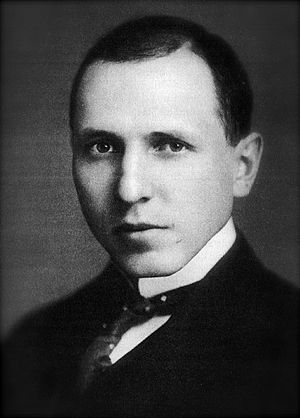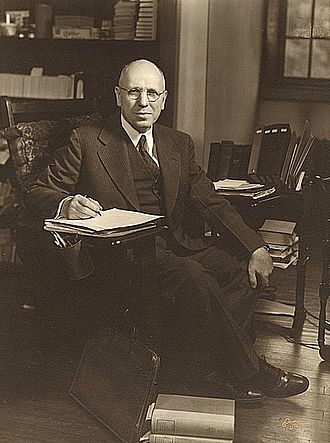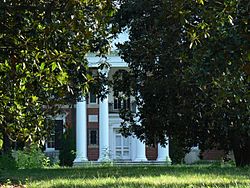Douglas Southall Freeman facts for kids
Quick facts for kids
Douglas Southall Freeman
|
|
|---|---|

Douglas Southall Freeman, c. 1916
|
|
| Born | May 16, 1886 Lynchburg, Virginia, U.S. |
| Died | June 13, 1953 (aged 67) Richmond, Virginia, U.S. |
| Occupation | Historian Biographer Newspaper editor Author |
| Spouse | Inez Virginia Goddin |
| Children | Mary Tyler Freeman Anne Ballard Freeman James Douglas Freeman |
Douglas Southall Freeman (born May 16, 1886 – died June 13, 1953) was an American historian, writer, and newspaper editor. He was also a radio speaker and author. He is most famous for his large biographies about two important American figures: Robert E. Lee and George Washington. He won the Pulitzer Prize for both of these amazing book series.
Contents
Early Life and Education
Douglas Southall Freeman was born on May 16, 1886, in Lynchburg, Virginia. His father, Walker Burford Freeman, was an insurance agent who had fought in the American Civil War under General Robert E. Lee. From a young age, Douglas was very interested in the history of the Southern United States.
In 1892, when he was six years old, his family moved to Richmond, Virginia. Richmond was once the capital of the Confederate States of America. At that time, many monuments were being built there to honor Confederate generals like Robert E. Lee.
Freeman was a very good student. In 1904, he earned his first degree from Richmond College. Then, in 1908, at just 22 years old, he earned a PhD in history from Johns Hopkins University in Baltimore.
After finishing his studies, Freeman wanted to teach history at a university. However, he couldn't find a teaching job. So, in 1909, he started working at a newspaper called the Richmond Times-Dispatch. By 1915, at age 29, he became the editor of The Richmond News Leader. He held this important job for 34 years!
Writing Important Books
Discovering Lost Letters
In 1911, Freeman found a hidden collection of letters. These were messages sent during the Civil War between General Robert E. Lee and the Confederate president, Jefferson Davis. Freeman spent four years carefully studying these documents.
In 1915, he published them in a book called Lee's Dispatches. Historians who study the Civil War were very excited about this book. It became a key source of information for understanding the war. The letters showed Lee's plans more clearly and explained some of his decisions. They also showed how closely Lee and Davis worked together.
Writing About Robert E. Lee
Because Lee's Dispatches was so successful, a publisher asked Freeman to write a full biography of Robert E. Lee. Freeman agreed, but he decided to keep his job as a newspaper editor. This meant he worked very long hours to do both jobs.
Freeman's research for the Lee biography was incredibly detailed. He looked at every piece of information he could find about Lee. He reviewed records from military schools and private collections. When he wrote about Lee's time in the Civil War, he used a special technique. He only gave readers the information that Lee himself knew at that exact moment. This helped readers feel the confusion of war and understand how Lee made his decisions.
His four-volume biography, R. E. Lee: A Biography, was published in 1934 and 1935. The New York Times called it "Lee complete for all time." In 1935, Freeman won the Pulitzer Prize for this amazing work.
Freeman spent about 6,100 hours working on this biography of Lee. His book helped create a way of studying the Civil War that focused on the war in the Eastern U.S., on generals, and on military battles. Some people later called him a "Lost Cause" historian. This term refers to writers who tried to explain the South's defeat in a way that honored the old Southern society.
Studying Lee's Commanders
After his successful book on Robert E. Lee, Freeman continued his study of the Confederacy. He wrote another highly praised three-volume series called Lee's Lieutenants: A Study in Command. These books were published in 1942, 1943, and 1944.
This series combined military strategy, biographies of generals, and Civil War history. It showed how armies actually work. The books were published during World War II and greatly influenced American military leaders. After the war, Freeman was even asked to visit American forces in Europe and Japan. This series made Freeman a top military historian, and he became friends with famous generals like George Marshall and Dwight D. Eisenhower.
The Life of George Washington
After finishing his detailed studies of Lee and his generals, Freeman began a huge project: a seven-volume biography of George Washington. He used the same careful research methods.
He published the first two volumes, called Young Washington, in 1948. The next year, he left his newspaper job to focus completely on this big project. Volumes 3 and 4 were published in 1951, and Volume 5 in 1952.
Freeman finished Volume 6 just before he died, and it was published in 1954. The last book, Volume 7, was completed by his assistants, John Alexander Carroll and Mary Wells Ashworth, using Freeman's research. It was published in 1957. Many historians believe Freeman's biography of Washington is one of the best ever written.
Other Careers and Influence
Freeman's achievements as a writer are well-known, but he also had a very important career as a newspaper editor. From 1915 to 1949, he wrote about 600,000 words of editorials every year! He became known across the country for his analysis of military operations during World War I and World War II.
He also expressed moderate views on race relations in his editorials. He often wrote against the powerful Byrd Organization, a political group in Virginia.
Freeman retired from The Richmond News Leader in 1949. His old newspaper later wrote that he campaigned for many things, like new laws and city improvements. They also mentioned his "Seventy Rules for Good Writing," where he said being brief was almost as important as being accurate.
Besides journalism, Freeman was one of the first radio news analysts, starting in 1925. His twice-daily radio broadcasts made him one of the most influential people in Virginia. From 1934 to 1941, he flew weekly to New York City to teach journalism at Columbia University. He also taught at the United States Army War College for seven years and served as the head of the University of Richmond.
Personal Life and Habits
Freeman was known for his incredible work ethic. He kept a very strict schedule to manage his two full-time careers. When he was home, he woke up at three every morning. He would drive to his newspaper office, often saluting Robert E. Lee's monument as he passed.
Twice a day, he walked to a nearby radio studio for his news broadcasts. After his second broadcast, he would go home for a short nap and lunch. Then, he would work another five or six hours on his history books, often listening to classical music by Joseph Haydn.
Freeman was a very religious Baptist. He prayed daily in a small chapel he built in his home. He believed his Christian faith was central to his life. He also loved Virginia and called himself "deeply rooted in the soil of old Virginia." He thought it was important for people to live in the same place for generations.
He believed strongly in good character and leadership. His definition of a good leader was: "Know your stuff, be a man, look after your men."
Freeman married Inez Virginia Goddin on February 5, 1914. They had three children: Mary Tyler, Anne Ballard, and James Douglas. His daughter, Mary Tyler Freeman, became a founder of several important community organizations. The family lived in a large house in Richmond called "Westbourne," where Freeman later died. This house is now listed on the National Register of Historic Places.
Death and Lasting Impact
Douglas Southall Freeman died from a heart attack on June 13, 1953, at his home in Richmond, Virginia. He was 67 years old. On the morning of his death, he had given his usual radio broadcast. He was buried in Hollywood Cemetery in Richmond.
Freeman's newspaper editorials and daily radio broadcasts made him one of the most influential Virginians of his time. His analysis of military campaigns during World War I and World War II brought him national recognition, especially among military leaders. President Franklin D. Roosevelt even thanked him for suggesting the term "liberation" instead of "invasion" for Europe.
Important military commanders like Admiral Chester W. Nimitz and Generals George Marshall, Douglas MacArthur, and Dwight D. Eisenhower sought his friendship and advice. Eisenhower said Freeman was the first person who made him seriously think about running for president.
In 1958, after his death, Freeman was awarded his second Pulitzer Prize for his six-volume biography of George Washington. In 1955, a special award for public service in radio journalism was created in his honor.
Some modern historians, like Eric Foner, have looked at Freeman's work more critically. Foner has called Freeman's biography of Lee a "hagiography" (meaning it praises Lee too much). He also noted that it didn't focus enough on Lee's relationship with slavery.
Honors and Awards
- 1935 Pulitzer Prize for R. E. Lee: A Biography (4 volumes)
- 1951 best news commentary over larger radio stations from Virginia Associated Press Broadcasters
- 1958 Pulitzer Prize (posthumous) for George Washington: A Biography (6 volumes)
- Douglas S. Freeman High School in Henrico County named in his honor
- University of Richmond Freeman Hall named in his honor



